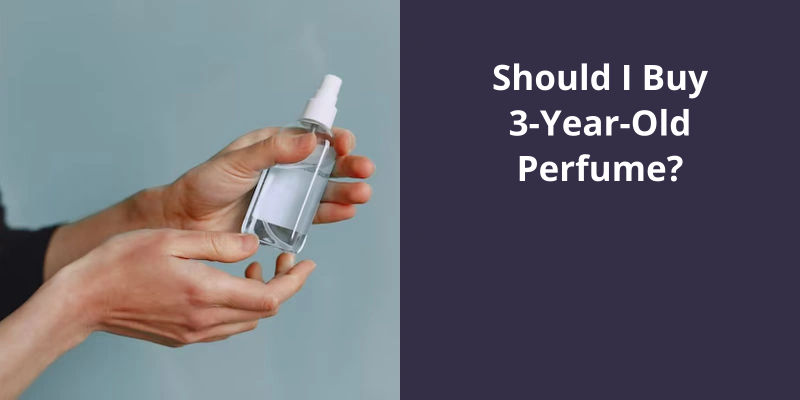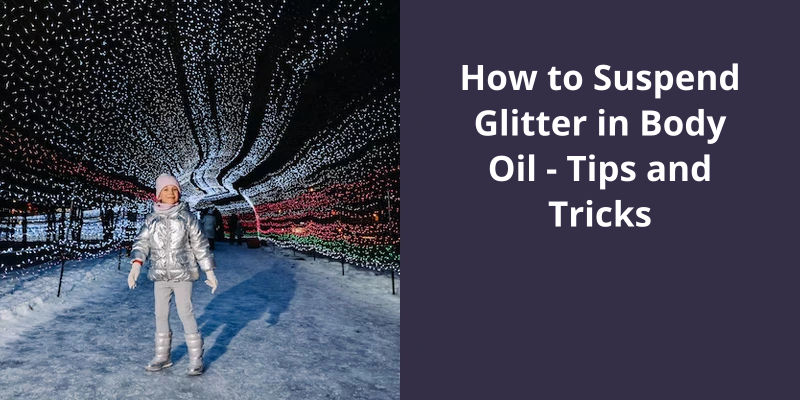The shelf life of a fragrance can vary depending on various factors such as the specific ingredients used, the storage conditions, and the quality of the perfume itself. While some perfumes may start to lose their potency and change in scent after a few years, others may still retain their original fragrance and quality. It's important to remember that not all perfumes have a hard expiration date, especially those from well-respected brand names like Chanel or Marc Jacobs. These perfumes are often formulated with high-quality ingredients and are designed to have a longer shelf life. However, it's worth noting that three to five years is generally considered the average shelf life of a fragrance.

Should You Let Perfumes Age?
However, should you wait three years before you decide to buy a perfume? The answer to that question depends on your personal preferences and expectations. Some perfumers and enthusiasts argue that allowing perfumes to age for a few years can enhance their complexity and depth. They believe that the ingredients have more time to blend and evolve, resulting in a smoother and more harmonious fragrance.
On the other hand, there are those who believe that perfumes should be enjoyed fresh and that aging may actually degrade the fragrance. They argue that some delicate top notes, which are responsible for the initial burst of scent, can evaporate or alter over time. Additionally, the overall composition of the perfume may change, possibly resulting in a less desirable scent.
Lighter and more citrus-based fragrances, such as Eau de Colognes, may not require as much maceration as heavy and complex Chypres.
How to Properly Store Perfumes to Prevent Degradation and Maintain Their Freshness
- Keep perfumes in a cool, dry place away from direct sunlight.
- Avoid storing perfumes in the bathroom or near any heat sources.
- Make sure the perfume cap is tightly closed to prevent air exposure.
- Store perfumes upright to prevent leakage or evaporation.
- Consider using a perfume tray or shelf to organize and protect your collection.
- Keep perfumes away from strong odors or chemicals that may alter their scent.
- If possible, store perfumes in their original packaging to provide additional protection.
- Rotate and use perfumes regularly to prevent them from sitting for too long.
- Check the expiration date and discard any perfumes that have expired.
In conclusion, purchasing vintage perfumes can be a safe and enjoyable experience, as long as certain factors are taken into consideration. The key is to ensure that the scent hasn’t “turned” over time and that your skin isn’t sensitive to the natural ingredients found in older fragrances. By being mindful of these aspects, you can confidently explore the world of vintage scents and discover hidden olfactory treasures.
Is It OK to Buy Old Perfume?
Perfume enthusiasts often find themselves questioning the idea of buying older perfume. Is it safe? Will it still smell good? These concerns are valid, as perfume can indeed go bad over time. However, fear not, for buying vintage scents is generally safe, provided certain conditions are met.
The key factor to consider when purchasing older perfume is whether it’s “turned.”. Perfume can turn due to exposure to light, heat, and oxygen, causing it to lose it’s original scent and sometimes develop an unpleasant or rancid odor. Therefore, it’s crucial to examine the condition of the bottle and it’s storage history. If the perfume has been stored properly, away from direct sunlight and extreme temperatures, the chances of it turning are significantly reduced.
Another vital aspect to consider is your skins tolerance to natural ingredients. Vintage perfumes often contain a higher concentration of natural essences than modern counterparts. While these ingredients can provide a beautiful and complex scent, some individuals may be sensitive or allergic to them. It’s wise to do a patch test on your skin before investing in a large bottle. If your skin reacts positively, you can confidently indulge in the delightful world of vintage perfumery.
It’s worth mentioning that certain perfume houses have maintained their formulas throughout the decades, ensuring the consistency and quality of their scents. These reputable brands have built a legacy based on their timeless fragrances, making them a safe bet when purchasing vintage perfume. Researching the brands history and reputation can provide valuable insights before making a decision.
It allows you to discover discontinued fragrances that were once beloved and cherished. The excitement of unearthing a hidden gem, the vintage bottle exuding the aroma of nostalgia, can be a captivating journey in itself. However, it’s essential to be cautious of purchasing from untrustworthy sources, as counterfeit perfumes can be prevalent in the market.
Additionally, ensuring your skin is compatible with natural ingredients will further enhance the experience. So, if you come across a 3-year-old perfume that meets these criteria, go ahead and indulge in the olfactory delights of the past.
Tips on Proper Perfume Storage to Prevent It From Turning.
Proper perfume storage is crucial in maintaining it’s quality and preventing it from turning, especially for 3-year-old perfumes. Here are some tips:
1. Keep perfumes in a cool, dark place away from direct sunlight. UV rays can degrade the fragrance and alter it’s scent.
2. Ensure the cap or lid is tightly sealed to minimize exposure to air, which can oxidize the perfume and change it’s aroma.
3. Avoid storing perfumes in humid areas like bathrooms, as moisture can compromise the fragrance’s integrity.
4. Keep perfumes away from fluctuations in temperature, as extreme heat or cold can negatively impact their composition.
5. It’s best to store perfumes in their original packaging to provide additional protection from light and air exposure.
Following these storage tips will help prolong the lifespan of your 3-year-old perfume and maintain it’s original scent for longer.
Conclusion
Firstly, consider the storage conditions of the perfume. If it’s been kept in a cool, dark place away from direct sunlight and extreme temperatures, it’s more likely to still be in good condition. Additionally, take into account the fragrance's overall quality and formulation. Certain notes and ingredients may degrade over time, resulting in a less desirable scent. Lastly, personal preference plays a role. Ultimately, trust your senses and make an informed decision based on the specific perfume in question.





